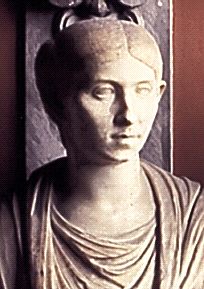Roman women--and Cleopatra
Portia, in Julius Caesar, is seen as a paragon of women: faithful, strong, and loving. She is nonetheless excluded from the knowledge of Brutus' political troubles. Similarly Calphurnia's fears are dismissed as "foolish" (2.2.105).
Like their Elizabethan counterparts, Roman women were expected to be of "holy, cold and still conversation [manner]" (Antony and Cleopatra 2.6.122-24). In Shakespeare's Roman plays, only Cleopatra exercises power directly*, and she is seen by all the Romans in the play as an enchantress, a sorcerer, rather than a monarch.
Footnotes
-
Women and power
Volumnia, in Coriolanus, is a powerful woman, but she in effect trains her son Coriolanus to be her weapon. The only direct action she takes is to persuade her son not to sack Rome.
Compare with Elizabeth I, who exercised her power through most of Shakespeare's career.
